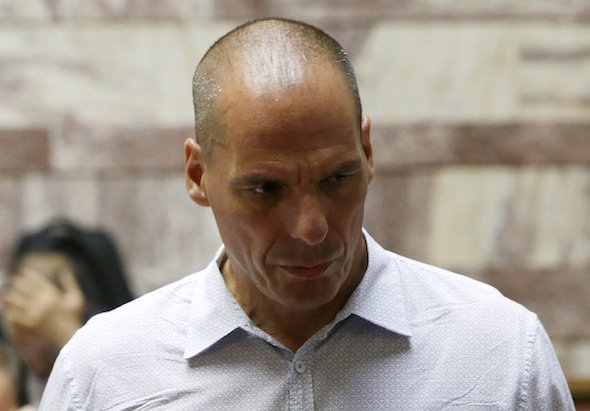Yanis Varoufakis Had a Plan B
Greece’s former finance minister had a contingency plan if the country’s creditors shut down its banking system and blocked its ability to do business with other countries, as they eventually did. And he’s being pilloried for it.

Yanis Varoufakis. (Petros Karadjias / AP)
Greece’s former finance minister had a contingency plan if the country’s creditors shut down its banking system and blocked its ability to do business with other countries, as they eventually did. And he’s being pilloried for it.
Philippe Legrain, author and former economic adviser to the president of the European Commission, writes at The Guardian:
While Varoufakis’s plan to create a parallel payments system based on the country’s tax register was certainly unorthodox, it was completely understandable. Until the recent revelations, Varoufakis was being criticised for standing up to Greece’s eurozone creditors without preparing a Plan B in case negotiations failed. As many experts and commentators, including me, advised, the Greek government needed to prepare for a parallel currency to provide liquidity to the economy in case eurozone authorities turned off the taps. That way it could credibly threaten to default on its debts while remaining in the eurozone – and thus, it hoped, convince its creditors to offer the debt relief that the depressed Greek economy desperately needed to recover.
But now it turns out Varoufakis did have a plan B, he is being attacked for that too. Some criticise the supposed recklessness and duplicity of preparing for a parallel currency that could have become a new drachma, given the government’s official commitment to staying in the euro. But that is disingenuous. Governments should and do prepare for all sorts of eventualities. The Bank of England is right to prepare for the possibility of Brexit, which may happen even though it is not government policy. One hopes that Whitehall has plans for dealing with a nuclear winter or a catastrophic epidemic. Varoufakis was right to prepare for how to cope with an outcome that wasn’t just possible, but likely.
Others object that the plan wouldn’t have worked. But why not? In principle, the idea of setting up a parallel payments system involving people’s tax numbers is ingenious. Since the value of the parallel currency would derive from the fact that the Greek government accepted it as payment for overdue, current and future taxes, it makes a lot of sense. Given that it takes time to print and distribute banknotes, starting with a purely electronic system is also sensible.
Continue reading here.
— Posted by Alexander Reed Kelly.
This year, we’re all on shaky ground, and the need for independent journalism has never been greater. A new administration is openly attacking free press — and the stakes couldn’t be higher.
Your support is more than a donation. It helps us dig deeper into hidden truths, root out corruption and misinformation, and grow an informed, resilient community.
Independent journalism like Truthdig doesn't just report the news — it helps cultivate a better future.
Your tax-deductible gift powers fearless reporting and uncompromising analysis. Together, we can protect democracy and expose the stories that must be told.
This spring, stand with our journalists.
Dig. Root. Grow. Cultivate a better future.
Donate today.








You need to be a supporter to comment.
There are currently no responses to this article.
Be the first to respond.